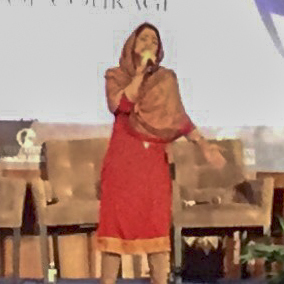A Quote by Sonita Alizadeh
When the Taliban was ruling Afghanistan, women were not allowed to go to school, to work, or even leave the house without a male chaperone. The greatest moment was when that ended.
Related Quotes
Not long ago, women in Afghanistan were required by Taliban leadership to be covered nearly head-to-toe and were barely allowed to leave the home; that young Afghan women today are not only accessing an education but are able to meet young people from around the world and cheer on a robot of their own making is something beautiful.
There was a time when the women of Afghanistan - at least in Kabul - were out there. They were allowed to study, they were doctors and surgeons, walking free, wearing what they wanted. That was when it was under Soviet occupation. Then the United States starts funding the mujahideen. Reagan called them Afghanistan's "founding fathers." It reincarnates the idea of "jehad," virtually creates the Taliban.
What everyone underestimated was the acute unpopularity of the Taliban, even in the Pashtun areas. People like myself were saying the Taliban would be driven out very swiftly from the north of Afghanistan, but given that their main support base was in the Pashtun belt, there would be greater resistance there. That didn't happen. The Taliban had become deeply unpopular and were actually discarded by the Pashtun population almost as quickly as they were in the north. I don't see the Taliban coming back in any way.
The draconian prohibitions of the Taliban years and the gains Afghan women have achieved since the Taliban government was overthrown in 2001 are now well known and often cited: Today, Afghans lucky enough to live in secure regions can go to school, women may work in offices, and the burqa is no longer mandatory.
In 2001, we were told that the war in Afghanistan was a feminist mission. The marines were liberating Afghan women from the Taliban. Can you really bomb feminism into a country? And now, after 25 years of brutal war - 10 years against the Soviet occupation, 15 years of US occupation - the Taliban is riding back to Kabul and will soon be back to doing business with the United States.
They [people of Afghanistan] didn't want Al-Qaeda in their country. They didn't appreciate the Taliban taking control. But they really have an incredible amount of dignity. And by that, they are grateful for America's help in ridding them of the Taliban. The average, ordinary person is glad that their daughter can go to school now. There's no public executions, no banning of soccer games. The difference is, they're appreciative, but they don't want any prolonged military presence of the United States there.
In mid-November 2001, as they moved toward the city of Kandahar, the Taliban's de facto capital in southern Afghanistan, Amerine's team called in airstrikes against advancing Taliban units and more or less obliterated a Taliban column of a thousand men that had been dispatched from Kandahar. It was the Taliban's final play to remain in power.



































